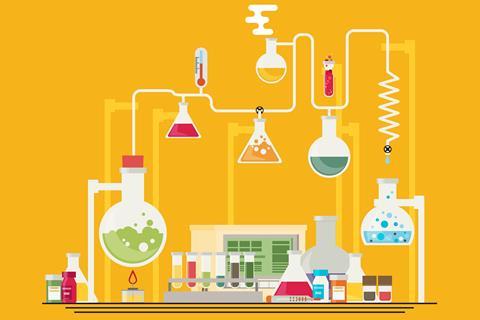Ideas for keeping up students’ practical skills while schools are closed

Practical work is an essential element of chemistry teaching – and presents a particular challenge in the context of distance learning. Having advised against setting standard secondary school science activities for students to do at home, CLEAPSS has published a list of worthwhile primary-level activities that could be carried out safely. However, there are other ways to ensure that this part of the chemistry curriculum isn’t neglected when teaching remotely.
Use online demonstrations
Practical simulations
The RSC offers a range of useful on-screen experiments and interactive simulations, as do places such as the Open Science Laboratory. Use these to teach students about key topics such as flame tests, titrations and acids and bases. The ACS also has a comprehensive list of other sources. Students can even use these to collect their own data and conduct investigations; you can hear how chemistry teacher David Paterson uses a particular reaction kinetics simulation to this end in our How I teach … series. (Plus, to get you started, the article comes with a downloadable rates of reaction investigation and example data collection sheet ready to use with your students).
Practical videos
In addition, YouTube has a wealth of video demonstrations that students could watch. For example, Malmesbury School’s YouTube channel covers a range of required practicals at GCSE and A-level – and there are many more. We’ve even collated a collection of videos showing recommended practicals for topics at 14–16 and 16–18, including additional teaching points, suggested questions and related resources. Perhaps you could even challenge your students to find the best demo of a particular practical to share with the class.
Discover more about the practicalities of teaching experimental skills online in the Education in Chemistry article Practical science at a distance.
Target planning and analysis skills
Get students to research and plan their own experiments – they don’t necessarily have to conduct them, but the planning will reinforce a range of key skills necessary for practicals. At the other end of the spectrum, give pupils sets of results to analyse in order to practise their data analysis and presentation skills, as well as drawing conclusions. (Or, as mentioned above, you can have students use online simulations to collect data.) See how chemistry teacher Elis Nunn did this successfullly with his 11–14 students in this article, where he talks about getting them to research how temperature and surface area affect the rate of dissolving jelly cubes in water.
Besides the copious RSC practical resources, Bronze CREST awards can be a great place to start. Many of the activities can be adapted to focus on planning, presenting data or drawing conclusions – and this approach could be applied to a range of practical experiments.
You can also use the resources from Emily Seeber’s article Help students evaluate experiments to improve students’ understanding of accuracy and reliability.
Read more about students planning their own practicals in the Education in Chemistry article Reinventing the chemistry practical.
Reinforce knowledge of practical procedures
Set students quizzes designed to boost their practical skills, such as these basic practical competencies and experimental skills quizzes (16–18). If you have signed up to Teach Chemistry, you can also access quizzes supporting key practical skills for chemistry on titrations, organic liquids and qualitative analysis (14–18). Another way to do this is to send your pupils diagrams from Chemix asking them to annotate them, or to have them draw the diagrams themselves before annotating.
Join Teach Chemistry
If you or your school have not yet signed up to Teach Chemistry, it’s quick and easy: simply create a free account today to gain full access to a range of exclusive benefits.
Use the opportunity for practical-based CPD
Supplement your practical teaching with some short further reading:
- Tips for helping your students follow written instructions
- How to get pupils to apply their practical knowledge to new and unfamiliar contexts
- Ideas to develop your students’ practical laboratory skills
- How to maximise learning from practicals
- Why considering the purpose of a practical helps your teaching
- How using multiple practicals and demonstrations helps students to better grasp a concept
- Why practical work builds reasoning
- Boosting students skills in monitoring reactions
Share your knowledge
Have you found another way to support students’ practical skills remotely? Share your experience with other teachers in the comment section below.
Practical work is an essential element of chemistry teaching – and presents a particular challenge in the context of distance learning. Having advised against setting standard secondary school science activities for students to do at home, CLEAPSS has published a list of worthwhile primary-level activities that could be carried out safely (bit.ly/3eF8ecA). However, there are other ways to ensure that this part of the chemistry curriculum isn’t neglected when teaching remotely.
Online demonstrations
The RSC offers a range of useful on-screen experiments (rsc.li/2VSuHua) and interactive simulations (rsc.li/3eCy54F), as do places such as the Open Science Laboratory. Use these to teach students about key topics such as flame tests, titrations and acids and bases. The ACS also has a comprehensive list of other sources (bit.ly/3cF79Qe).
In addition, YouTube has a wealth of video demonstrations that students could watch. For example, Malmesbury School’s YouTube channel ‘Malmesbury Education’ covers a range of required practicals at GCSE and A-level – and there are many more. Perhaps you could even challenge your students to find the best demo of a particular practical to share with the class.
Discover more about the practicalities of teaching experimental skills online in the Education in Chemistry article ‘Practical science at a distance’ (rsc.li/3cF7SAW).
Target planning and analysis skills
Get students to research and plan their own experiments – they don’t necessarily have to conduct them, but the planning will reinforce a range of key skills necessary for practicals. At the other end of the spectrum, give pupils sets of results to analyse in order to practise their data analysis and presentation skills, as well as drawing conclusions. Besides the copious RSC practical resources (edu.rsc.org/resources/practical), Bronze CREST awards can be a great place to start. Many of the activities can be adapted to focus on planning, presenting data or drawing conclusions – and this approach could be applied to a range of practical experiments.
You can also use the resources from the article ‘Help students evaluate experiments’ to improve students’ understanding of accuracy and reliability (rsc.li/3czv3wi).
Read more about students planning their own practicals in the article ‘Reinventing the chemistry practical’ (rsc.li/3eCzmst).
Reinforce knowledge of practical procedures
Set students quizzes designed to boost their practical skills, such as these basic practical competencies (rsc.li/2VM2THx) and experimental skills (rsc.li/2VMlW4D) quizzes for ages 16–18. If you have signed up to the RSC’s free Teach Chemistry service, you can also access quizzes supporting key practical skills for chemistry on titrations, organic liquids and qualitative analysis for ages 14–18 (rsc.li/3eHWaaa).
Use the opportunity for practical-based CPD
Supplement your practical teaching with some short further reading:
- Tips for helping your students follow written instructions: rsc.li/2RYeUsp
- How to get pupils to apply their practical knowledge to new and unfamiliar contexts: rsc.li/2RXg5Z3
- Ideas to develop your students’ practical laboratory skills: rsc.li/3eBvaJA
- Rule 5 of the EEF’s 7 simple rules: use practical work purposefully and as part of a learning sequence: rsc.li/2VNH4aM
- Boosting students skills in monitoring reactions: rsc.li/2zhMbIx
Learning at home

A selection of resources for keeping up chemistry while remote learning
- 1
- 2
- 3
- 4
 Currently
reading
Currently
reading
How to teach practical chemistry remotely


















No comments yet